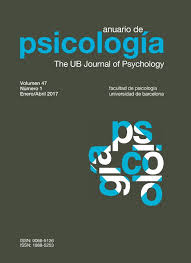Relationship between emotional intelligence profiles and psychological wellbeing of people with spinal cord injury
DOI:
https://doi.org/10.1344/%25xPalabras clave:
Emotional intelligence, Well-Being, Acquired disability, Intervention programsResumen
ObjectiveThe present study is aimed to analyze different emotional intelligence (EI) profiles in a group of people with spinal cord injury by traffic accidents. At the same time, significant differences in psychological well-being among profiles previously identified are also analyzed.
MethodTrait Meta-Mood Scale-24 (TMMS-24) and the Psychological Well-Being Scale of Ryff [Escala de Bienestar Psicológico de Ryff] were administered to 94 people with spinal cord injury by traffic accidents, aged from 21 to 55 years (M=38.68; SD=7.36).
ResultsCluster analyses allowed identifying three different EI profiles: a group of students with low EI profile, a group with predominance of high emotional clarity and emotional regulation and low emotional attention, and finally, a group of young people with high IE. Also, results revealed significant statistical differences in most domains of well-being among profiles. The people in groups with high overall scores in EI and clarity and repair emotional obtained higher scores on the different profiles of psychological well-being.
ConclusionResults suggest the need of going in depth on EI knowledge and design psychological well-being programs for people with spinal cord injury.
Descargas
Número
Sección
Licencia
El/la autor/a que publica en esta revista está de acuerdo con los términos siguientes:
El/la autor/a cede en exclusiva todos los derechos de propiedad intelectual al/la editor/a para todo el mundo y toda la duración de los derechos de propiedad intelectual vigentes aplicables.
El/la editor/a difundirá los textos con todos los derechos reservados.
El/la autor/a puede difundir una copia de sus artículos respetando la política de acceso libre de la revista.


